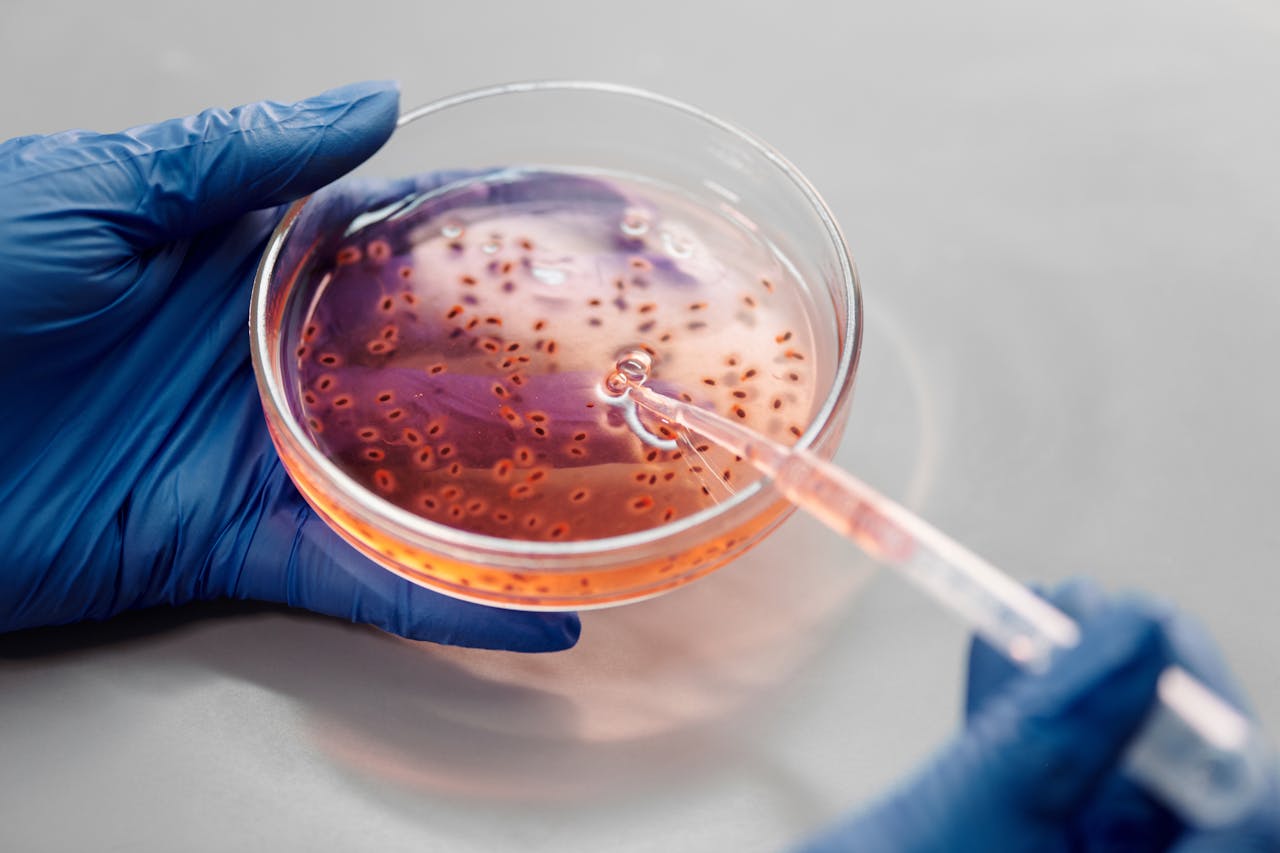Did you know that you carry around more bacterial cells in your gut than there are human cells in your entire body? This vast community of microorganisms, known as the gut microbiome, is not just a passive passenger. In fact, it’s a crucial player in your health, influencing everything from your risk of diabetes to your mental well-being and immune function.
Consider this: the diversity of bacteria in your intestines can dictate how your body responds to different foods, impacts your likelihood of developing certain diseases, and even affects your mood and cognitive functions. With recent studies revealing that these bacteria can communicate directly with your brain through millions of nerves, the implications for health and disease are fascinating.
Understanding Gut Bacteria
Did you know that our bodies are bustling with life far beyond what we can see? Trillions of microorganisms, including bacteria, viruses, fungi, and others, inhabit primarily our intestines and skin. A major hub for these microorganisms is the cecum, a part of the large intestine, all of which constitute what we refer to as the gut microbiome.
Interestingly, our body houses more bacterial cells than human cells—around 40 trillion bacteria compared to 30 trillion human cells. This fact essentially makes us more bacterial than human! Within our gut microbiome, there are as many as 1,000 different species of bacteria. Each species plays a crucial role in our health, aiding in everything from nutrient absorption and vitamin K synthesis to supporting our immune and nervous systems.
These microbes collectively weigh about as much as our brain—between 2 to 5 pounds—and function similarly to an organ. They are indispensable to our wellbeing, assisting in food digestion, vitamin production, and even the regulation of blood vessels and nerves within the digestive tract.
However, maintaining the right balance of these bacteria is critical. Factors like antibiotic use, illness, stress, aging, poor dietary habits, and lifestyle changes can disrupt this balance, leading to dysbiosis. This imbalance in gut bacteria can lead to a range of chronic diseases, including inflammatory bowel disease, obesity, cancer, and even neurological conditions such as autism. Understanding and managing our gut microbiome is thus a vital part of maintaining overall health and preventing disease.

How Your Gut Bacteria Influence Body Weight and Obesity
Our gut bacteria are more influential on our body weight than you might expect. Within our intestines, thousands of different bacterial types exist, primarily benefiting our health. However, an imbalance where harmful microbes outnumber beneficial ones can lead to gut dysbiosis, which has been linked to weight gain.
Research involving identical twins—one obese and one lean—has revealed that even with identical genetics, their gut bacteria can differ significantly. This suggests that our microbiome’s composition, influenced by our environment and lifestyle rather than our genetics, plays a key role in our body weight. For instance, studies have shown that mice implanted with the microbiome of an obese twin tend to gain more weight than those receiving a microbiome from the lean twin, despite having the same diet.
This connection is partly due to the types of bacteria present. People with obesity often have a higher ratio of Firmicutes to Bacteroidetes bacteria. These bacteria are adept at extracting calories from food and may influence fat storage. Furthermore, they produce metabolic by-products like short-chain fatty acids, which have been linked to increased fat storage and inflammation—factors that contribute to weight gain.
On a positive note, certain probiotics found in fermented foods like yogurt can promote a healthier balance of gut bacteria. Although the weight loss associated with probiotics is modest, they support a healthy gut microbiome which can indirectly help manage weight.
How Your Gut Microbiome Impacts Your Heart Health
Studies involving 1,500 people have shown that gut bacteria play a crucial role in promoting “good” HDL cholesterol and managing triglycerides, which are essential for heart health. This suggests that certain beneficial bacteria can help reduce the risk of heart disease by improving our lipid profiles.
However, the influence of gut bacteria on heart health isn’t entirely beneficial. Some species contribute to heart disease by producing trimethylamine N-oxide (TMAO), a compound formed when gut bacteria break down choline and L-carnitine, nutrients found in red meat and other animal-based foods. High levels of TMAO are linked to blocked arteries, increasing the risk of heart attacks and strokes.
Yet, there is also promising research pointing towards the benefits of probiotics, particularly Lactobacilli, in heart health. These beneficial bacteria can reduce cholesterol levels, lowering heart disease risks by decreasing cholesterol absorption in the gut.
Moreover, in conditions like chronic heart failure (CHF), gut bacteria’s role becomes even more evident. Increased concentrations of certain bacteria in CHF patients can exacerbate heart problems by contributing to an inflammatory response that worsens cardiac function. Conversely, beneficial strains such as Lactobacillus plantarum have been shown to improve heart health by reducing cholesterol and inflammation, further underscoring the complex relationship between our gut microbiome and heart health.
How Gut Bacteria Is Linked to Your Diabetes Risk
The gut microbiome plays a crucial role in controlling blood sugar levels, influencing the risk of developing diabetes. Research shows that changes in the gut bacteria can precede the onset of type 1 diabetes, marked by a reduction in microbiome diversity and an increase in harmful bacterial species. This suggests that monitoring gut bacteria could potentially serve as an early indicator for the disease.
Further studies highlight how gut bacteria affect individual responses to food, explaining why blood sugar levels can vary dramatically between people eating the same meals. This insight could lead to personalized dietary recommendations based on one’s gut flora to better manage or prevent diabetes.
Type 2 diabetes has also been linked to gut bacteria through diet-induced obesity and inflammation. High-fat diets can alter gut flora, triggering inflammation and insulin resistance, which are precursors to diabetes. Specific bacteria, like Bifidobacterium spp., show a beneficial effect by improving glucose tolerance and reducing inflammatory markers associated with diabetes and obesity.
How Gut Bacteria Influence Brain Health
The gut microbiome’s impact extends to the brain, offering potential benefits through several mechanisms. One of the key ways gut bacteria affect brain health is through the production of neurotransmitters. For instance, a significant portion of serotonin, known as an antidepressant neurotransmitter, is produced in the gut. This production is influenced by specific species of gut bacteria, highlighting a direct biochemical connection between the gut and emotional well-being.
Additionally, the gut is physically linked to the brain via millions of nerves, forming a pathway known as the gut-brain axis. This connection means that the state of the gut microbiome can influence the messages sent along these nerves, potentially impacting everything from mood to cognitive functions.
Research has found notable differences in the gut bacteria composition of individuals with various psychological disorders compared to those without such conditions, suggesting a relationship between gut microbial diversity and mental health. However, it remains to be determined whether these differences are a cause or effect of the disorders, as diet and lifestyle can also influence gut bacteria.
Emerging studies also indicate that probiotics can improve symptoms of depression and other mental health issues. These findings support the potential of targeting gut health to influence brain function and overall mental well-being, although more research is needed to fully understand these interactions.

How Gut Microbiome Is Crucial to Your Immune System
Gut bacteria are fundamental to our immune system, helping to build and maintain defenses against infection from a young age. For instance, breastfed babies tend to develop healthier gut microbiota, which not only strengthens their immunity early on but may also protect against health issues like obesity and diabetes later in life.
The gut provides two main lines of defense: a mechanical barrier, made up of intestinal cells and mucus, and an immune barrier, which includes immune cells like lymphocytes and macrophages. Beneficial gut bacteria support these barriers by competing with pathogens for nutrients and attachment sites, reducing the chance of harmful bacteria taking hold. They also produce acids and other compounds that inhibit pathogen growth and lower the gut’s pH, making the environment less hospitable to invaders.
Moreover, gut bacteria interact with immune tissues such as the gut-associated lymphoid tissue (GALT), priming immune cells and aiding in the development of a diverse antibody repertoire. They also stimulate the production of immunoglobulin A (IgA), an antibody essential for regulating microbial communities in the gut and maintaining balance.
This close partnership between gut bacteria and immune function underlines the importance of a healthy gut microbiome in supporting a resilient immune system, emphasizing the value of diet and lifestyle choices that nurture gut health.

My Personal RX on Nurturing Your Gut Bacteria to Enhance Whole Body Health
The health of your gut bacteria, or microbiome, plays a crucial role in the overall wellness of your entire body. As a healthcare professional, I emphasize the importance of nurturing your gut microbiome as it impacts everything from immune function and inflammation to mental health and chronic disease prevention. A well-balanced gut microbiome supports digestion, enhances nutrient absorption, and contributes to a robust immune system.
- Incorporate a Variety of Fibers: Diverse dietary fibers feed different populations of beneficial bacteria in the gut. Include a wide range of fiber-rich foods like fruits, vegetables, legumes, and whole grains in your diet to encourage a healthy and diverse microbial community.
- Utilize MindBiotic Supplements: MindBiotic offers a targeted blend of probiotics, prebiotics, and Ashwagandha, which supports the gut-brain axis, reduces stress, and maintains healthy gut flora. This supplement can help balance your microbiome, which is essential for overall health.
- Stay Hydrated: Drinking enough water is crucial for maintaining the mucosal lining of the gut, which houses a significant portion of your gut bacteria. Proper hydration helps keep this environment suitable for beneficial bacteria to thrive.
- Limit Processed Foods and Sugars: High amounts of sugar and processed foods can disrupt your microbiome balance by feeding harmful bacteria and yeasts. Reducing these foods can help maintain a healthy gut flora and improve your overall health.
- Incorporate Fermented Foods: Fermented foods like yogurt, kefir, sauerkraut, and kombucha are rich in probiotics, which are live beneficial bacteria. Regular consumption of these foods can help enhance the diversity and health of your gut microbiome.
- Read Heal Your Gut, Save Your Brain: This book dives deep into the connection between gut health and overall wellness, including brain health. It provides a comprehensive guide on nurturing your gut through diet and other holistic practices, offering actionable insights to improve your health.
- Exercise Regularly: Physical activity can influence the balance and composition of the gut microbiome. Regular exercise is not only good for your general health but also promotes a healthier gut.
- Manage Stress: High levels of stress can negatively affect your gut bacteria. Incorporate stress management techniques such as mindfulness meditation, yoga, or regular relaxation practices into your daily routine to help preserve a healthy gut microbiome.
- Avoid Unnecessary Antibiotics: While antibiotics are essential for treating certain infections, unnecessary use can harm your gut microbiome. Always discuss the need for antibiotics with your healthcare provider and explore alternatives when appropriate.
Sources:
- Turnbaugh, P. J., Hamady, M., Yatsunenko, T., Cantarel, B. L., Duncan, A., Ley, R. E., Sogin, M. L., Jones, W. J., Roe, B. A., Affourtit, J. P., Egholm, M., Henrissat, B., Heath, A. C., Knight, R., & Gordon, J. I. (2008). A core gut microbiome in obese and lean twins. Nature, 457(7228), 480–484. https://doi.org/10.1038/nature07540
- Ridaura, V. K., Faith, J. J., Rey, F. E., Cheng, J., Duncan, A. E., Kau, A. L., Griffin, N. W., Lombard, V., Henrissat, B., Bain, J. R., Muehlbauer, M. J., Ilkayeva, O., Semenkovich, C. F., Funai, K., Hayashi, D. K., Lyle, B. J., Martini, M. C., Ursell, L. K., Clemente, J. C., . . . Gordon, J. I. (2013). Gut Microbiota from Twins Discordant for Obesity Modulate Metabolism in Mice. Science, 341(6150). https://doi.org/10.1126/science.1241214
- Zhang, Q., Wu, Y., & Fei, X. (2016). Effect of probiotics on body weight and body-mass index: a systematic review and meta-analysis of randomized, controlled trials. International Journal of Food Sciences and Nutrition, 67(5), 571–580. https://doi.org/10.1080/09637486.2016.1181156
- Fu, J., Bonder, M. J., Cenit, M. C., Tigchelaar, E. F., Maatman, A., Dekens, J. A., Brandsma, E., Marczynska, J., Imhann, F., Weersma, R. K., Franke, L., Poon, T. W., Xavier, R. J., Gevers, D., Hofker, M. H., Wijmenga, C., & Zhernakova, A. (2015). The gut microbiome contributes to a substantial proportion of the variation in blood lipids. Circulation Research, 117(9), 817–824. https://doi.org/10.1161/circresaha.115.306807
- Wang, Z., Klipfell, E., Bennett, B. J., Koeth, R., Levison, B. S., DuGar, B., Feldstein, A. E., Britt, E. B., Fu, X., Chung, Y., Wu, Y., Schauer, P., Smith, J. D., Allayee, H., Tang, W. H. W., DiDonato, J. A., Lusis, A. J., & Hazen, S. L. (2011). Gut flora metabolism of phosphatidylcholine promotes cardiovascular disease. Nature, 472(7341), 57–63. https://doi.org/10.1038/nature09922
- Kostic, A. D., Gevers, D., Siljander, H., Vatanen, T., Hyötyläinen, T., Hämäläinen, A., Peet, A., Tillmann, V., Pöhö, P., Mattila, I., Lähdesmäki, H., Franzosa, E. A., Vaarala, O., De Goffau, M., Harmsen, H., Ilonen, J., Virtanen, S. M., Clish, C. B., Orešič, M., . . . Xavier, R. J. (2015). The Dynamics of the Human Infant Gut Microbiome in Development and in Progression toward Type 1 Diabetes. Cell Host & Microbe, 17(2), 260–273. https://doi.org/10.1016/j.chom.2015.01.001
- Zeevi, D., Korem, T., Zmora, N., Israeli, D., Rothschild, D., Weinberger, A., Ben-Yacov, O., Lador, D., Avnit-Sagi, T., Lotan-Pompan, M., Suez, J., Mahdi, J. A., Matot, E., Malka, G., Kosower, N., Rein, M., Zilberman-Schapira, G., Dohnalová, L., Pevsner-Fischer, M., . . . Segal, E. (2015). Personalized nutrition by prediction of glycemic responses. Cell, 163(5), 1079–1094. https://doi.org/10.1016/j.cell.2015.11.001
- Rogers, G. B., Keating, D. J., Young, R. L., Wong, M., Licinio, J., & Wesselingh, S. (2016). From gut dysbiosis to altered brain function and mental illness: mechanisms and pathways. Molecular Psychiatry, 21(6), 738–748. https://doi.org/10.1038/mp.2016.50
- Jiang, H., Ling, Z., Zhang, Y., Mao, H., Ma, Z., Yin, Y., Wang, W., Tang, W., Tan, Z., Shi, J., Li, L., & Ruan, B. (2015). Altered fecal microbiota composition in patients with major depressive disorder. Brain Behavior and Immunity, 48, 186–194. https://doi.org/10.1016/j.bbi.2015.03.016
- Zhang, Y., Li, S., Gan, R., Zhou, T., Xu, D., & Li, H. (2015). Impacts of gut bacteria on human health and diseases. International Journal of Molecular Sciences, 16(12), 7493–7519. https://doi.org/10.3390/ijms16047493











 Subscribe to Ask Dr. Nandi YouTube Channel
Subscribe to Ask Dr. Nandi YouTube Channel









